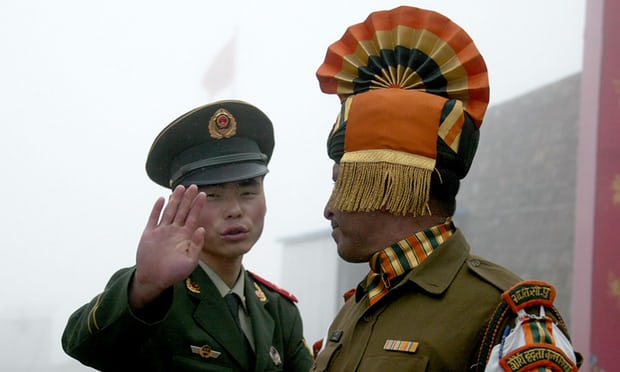 KATHMANDU, July 25 (Nepal Foreign Affairs)–Ongoing border standoff between China and India over Doklam or Donglang has been a major concern in Nepal too.
KATHMANDU, July 25 (Nepal Foreign Affairs)–Ongoing border standoff between China and India over Doklam or Donglang has been a major concern in Nepal too.
China claims this territory which is located near Chumbi valley, a strategically important tri-junction point between India, Bhutan and China.
It is hardly 90 kilometers away from the Siliguri Corridor, which is a bigger buffer to its sensitive Chicken’s Neck according to Indian perspective. Siliguri Corridoor is an extremely narrow stretch of land that connects the Northeast to the rest of India.
From the Chumbi Valley it is just a little over 100 kilometres away. The Doklam Plateau, north of the tri-junction of Sikkim, Bhutan and Tibet, by India’s claim, is not just a disputed area, but has huge strategic significance for both India and China.
Chinese and Indian troops have been at face-off since 6 June after Chinese troops started constructing road in Doklam and later on demolished the bunkers of Indian border force stationed there. For a week or so, India remained silent. Thereafter, India came heavily against China referring Bhutan’s request to deal with China on behalf of Bhutan. Thimpu has endorsed India’s move.
Latest remarks from both the sides suggest that they are going for another round of war amid the border standoff. The tug-of-war has continued for a month or so. China has asked India to immediately withdraw troops first from Doklam while India has maintained that China should pullout the PLA. Some Nepal security and foreign affairs experts have called on the government to make its position on the China-India standoff clear and gear up for any contingencies.
Some others hold the opposite view; they say that Nepal should remain neutral in such a sensitive issue where both the neighbors are in a mood to test their military power. Nepal’s official statement of any type might adversely impact our relationship with both the neighbors since it is a high time for Kathmandu to maintain balanced ties with Beijing and Delhi. Nepal has not officially made public its position so far over the issue. Indeed, this is a border dispute between China and Bhutan, not between China and India.
It is notable here to mention that China and Bhutan have already held 22 round of talks to settle these territorial disputes, however it remained futile due to deliberate intervention from the Indian side thus complicating the situation further. India has a fear that whether Beijing makes delicate attempts to make presence in Thimphu though China and Bhutan don’t have diplomatic relations yet and it is because of India.
China believes that Doklam has already been defined as Chinese territory under the 1980 Convention between China and the British. Recently, China has released a map as evidence though India and Bhutan don’t agree upon it. India came up in favor of Bhutan since it believes the country as its protectorate. The foreign policy and defense of Bhutan is still controlled by India though New Delhi treats the tiny Himalayan nation as a sovereign country officially.
Nepal society is internally divided. There is a strong opinion in a section of society in Nepal that country’s position must be in favor of small land-locked nations, whose sovereignty and territorial integrity should be safeguarded. Which is logical. This school of thought says that Nepal could urge both the neighbors to find a wise peaceful solution through the diplomatic channels.
Nepal has a bitter experience when it suffered after China and India agreed to utilize Lipulekh, a Nepali territory, for their border trade in 2015 during Indian Prime Minister Narendra Modi’s visit to Beijing, at a time when both the countries were having excellent ties. The two powerful neighbors reached the deal even without any prior consultation with Nepal, thus infringing territorial integrity and sovereignty of a tiny neighbor. Historical documents suggest that Lipulek is a Nepali territory.
The agreement between India and China over Lipulekh hurt the Nepalese sentiments. It was taken as Chinese endorsement of border encroachment by India in Nepal. As Indian troops encroached a huge portion of Nepalese territory in Kalapani after 1962 war between China and India, nearby Lipulekh, many Nepali believed that China endorsed India’s border encroachment in Nepal. The Indian troops have their base in Kalapani, which India feels a strategically important. However, Chinese side conveyed to Nepali side that they were ready to correct the mistakes.
In such a background, Nepal’s official version will not carry any meaning. Anytime both the sides may go onto war, thus Nepal’s diplomatic effort will be futile. The prudent diplomacy of Nepal this time would be to remain silent over the issue.

